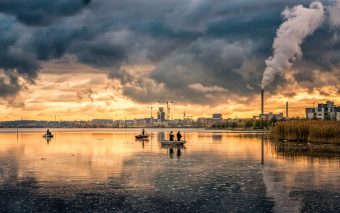
Air pollution is the biggest environmental health risk of our time. It also exacerbates climate change, causes economic losses, and reduces agricultural productivity.
It knows no borders – everyone has a responsibility to protect our atmosphere and ensure healthy air for all. By collaborating across borders, sectors, and silos, we can reduce air pollution through collective investments of time, resources and efforts.
This International Day of Clean Air for blue skies, we call upon everyone—from governments and corporations to civil society and individuals—to Invest in #CleanAirNow. By tackling air pollution proactively, we can achieve transformative change and secure healthy air for all.
A two-fold problem
Health impact: tiny, invisible particles of pollution penetrate deep into our lungs, bloodstream and bodies. These pollutants are responsible for about one-third of deaths from stroke, chronic respiratory disease, and lung cancer, as well as one quarter of deaths from heart attack. Ground-level ozone, produced from the interaction of many different pollutants in sunlight, is also a cause of asthma and chronic respiratory illnesses.
Climate impact: short-lived climate pollutants (SLCPs) are among those pollutants most linked with both health effects and near-term warming of the planet. They persist in the atmosphere for as little as a few days or up to a few decades, so reducing them can have an almost immediate health and climate benefits for those living in places where levels fall.
More:
- How an Innovative Liquid Removes 98 Percent of Nanoplastics from Water
- How Modern Aircraft Flights Affect the Climate
- EU Tightens Measures on Industrial Emissions
Preventing and reducing air pollution to improve air quality globally
Аir pollution is the single greatest environmental risk to human health and one of the main avoidable causes of death and disease globally, with some estimated 6.5 million premature deaths (2016) across the world attributed to indoor and outdoor air pollution. Particularly in developing countries, air pollution disproportionately affects women, children and the elderly, especially in low-income populations as they are often exposed to high levels of ambient air pollution and indoor air pollution from cooking and heating with wood fuel and kerosene.
Аir pollution is a global problem with far-reaching impacts owing to its transport over long distances. In the absence of aggressive intervention, the number of premature deaths resulting from ambient air pollution is estimated to be on track to increase by more than 50 per cent by 2050.

Society bears a high cost of air pollution due to the negative impacts on the economy, work productivity, healthcare costs and tourism, among others. Hence, the economic benefits of investing in air pollution control cannot be overestimated, and it must be understood that there is also an economic rationale to act and that cost-effective solutions exist to address air pollution.
Poor air quality is a challenge in the context of sustainable development for all countries, in particular in cities and urban areas in developing countries, with levels of air pollution that are higher than the limits set out in the World Health Organization air quality guidelines.
Some air pollutants, such as black carbon, methane and ground-level ozone, are also short-lived climate pollutants and are responsible for a significant portion of air pollution-related deaths, as well as impacts on crops and hence food security, so their reduction has co-benefits for the climate.
Source: UN



